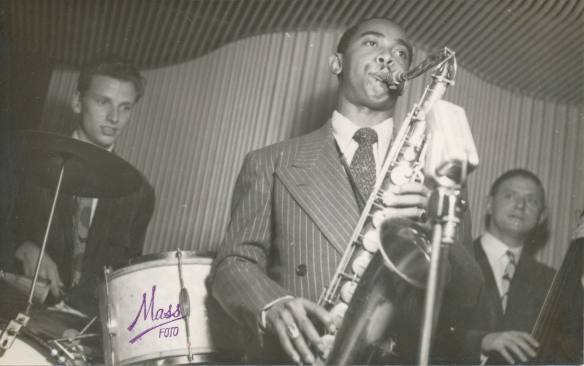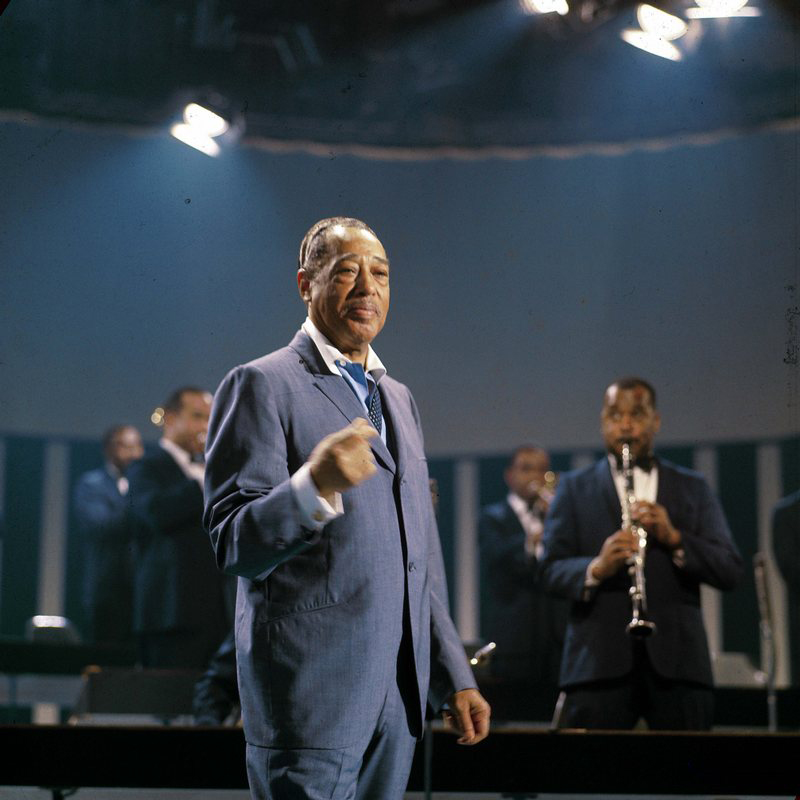When I visited the University of Massachusetts in 1975 to look into returning to college, one of the first faculty members I met with was Archie Shepp. I’d been astonished when my cousin Tara told me earlier that year that Shepp and Max Roach were on the faculty in Amherst, and that alone was enough to make me seek a westerly path from Worcester. It would take a few years for me to complete a BA, but along the way I got to know and study with these jazz giants and to take a flyer into the music business with Archie. Suffice to say that between that line of work and jazz radio, I’m sure glad I chose the latter, but that’s another story for another time.
What inspires today’s missive is the discovery on YouTube of footage of a concert appearance that Shepp mentioned at that first meeting. When I told him that Duke Ellington, who’d died the previous year, was a centering force in my life, he mentioned an encounter he’d had with Duke six years earlier. I knew Shepp’s music well enough to know that he’d recorded a handful of Ellington songs by then, among them “In a Sentimental Mood,” “Prelude to a Kiss,” “I Got It Bad,” and “Sophisticated Lady.” A year before our meeting, he’d recorded a sumptuous arrangement of Ellington’s great spiritual, “Come Sunday,” with vocalist Joe Lee Wilson. Shepp was one of the more outspoken firebrands of the sixties, but his devotion to Ellington ballads hinted at a romantic streak lying beneath his fiery iconoclasm, and that made him all the more intriguing and approachable.
Sitting in Professor Shepp’s office on the third floor of New Africa House, a former dormitory that had become the home of the University’s W.E.B DuBois Department of Afro-American Studies, he told me about the occasion in which he sat in with the Ellington Orchestra. His entree to Duke was Don Byas, the tenor saxophone legend whom he’d met on previous tours that brought him through Paris. Byas had resided in the French capitol since 1946.
The Oklahoma-born Byas was one of the jazz greats who straddled the swing and bebop eras; his affiliations included a dizzying array of territory bands in the thirties and Dizzy Gillespie’s 1944 quintet, the first bebop combo to play 52nd Street. He was also close with Art Tatum, and often credited the pianist as a prime influence. In the collection of candid interviews that drummer Art Taylor conducted and published as Notes and Tones, Byas stated, “Art Tatum really turned me on. He used to sit down and talk to me and one day he said, ‘Don, don’t ever worry about what you’re going to play or where the ideas are going to come from. Just remember there is no such thing as a wrong note…as long as you know how to get to the next note.’ Tatum turned me on to that. He was a genius.” In the same collection, tenor saxophonist Johnny Griffin told Taylor, “I used to say Don was the Tatum of the saxophone. But until I spoke to Don recently, I didn’t know how close he had been with Tatum.”
The influence of Tatum and Coleman Hawkins contributed to Byas’s commanding harmonic sophistication and his open-mindedness to new developments in jazz. Shepp spoke of him with reverence, and he was a model for others including Lucky Thompson, Sonny Rollins, John Coltrane, Benny Golson, and Charlie Parker. Byas told Taylor, “Bird got a lot of things from me. I met Bird when he was about fourteen in Kansas City…Even after Bird got to New York…he used to always come and get me…He would say, ‘Come on Don, we’re going to play “Cherokee”.’ That was his favorite tune.”
https://www.youtube.com/watch?v=HAlfULQnNaA
Byas recorded “Cherokee” shortly before he sailed for France in 1946. He was clearly in the forefront of tenor stylists at the time; European audiences wouldn’t have been accustomed to hearing such mastery since Hawkins had returned to the States in 1939 after his five-year sojourn across Europe. Just below is Byas revisiting “Cherokee” on a session that Cannonball Adderley produced on him and the expatriates Bud Powell, Idrees Sulieman, and Kenny Clarke. Adderley rarely played the Ray Noble song long identified with Parker, but he jumps in here with a solo that mirrors “Ko Ko,” Parker’s elaboration on “Cherokee.” Listen for Cannonball mimicking the sound of a European police siren ten seconds into the piece. Byas enters at 2:20.
Between 1929 and ’41, the year he succeeded Lester Young with Count Basie, Byas played with over a dozen bands. He worked with Basie for two years, a period marked by a curtailment in recording activity due to a musicians’ strike, but he managed to make a few sessions with Basie and played this sublime chorus on “Harvard Blues.” Writing in The Swing Era, Gunther Schuller said the solo is “virtually flawless…perfectly constructed…simple and affecting, poignant and languorous.”
During his Basie tenure, Byas became associated with the after-hours scene at Minton’s, the Harlem nightclub where Gillespie, Charlie Christian, Thelonious Monk, and others were shaping a new music. Charlie Parker recalled hearing him at Monroe’s, telling Leonard Feather, “Don Byas was playing everything there was to be played.” When Dizzy introduced modern jazz at the Onyx Club on 52nd Street in 1944 with George Wallington, Oscar Pettiford, and Max Roach, Parker was awol from the group. Byas, meanwhile, was working opposite them in guitarist Al Casey’s trio, but according to Gillespie, “We were cooking so much that Don Byas…said ‘Unh, unh,’ and he came to our rehearsals and joined our group.”

Two years later, Byas went abroad with Don Redman’s Orchestra, the first jazz band to tour Europe after World War II. (Click here for a memorabilia-laden web feature on Redman’s tour.) In Notes and Tones, Taylor asked, “You were one of the first musicians to settle in Europe?” “I was the first,” Byas asserted in the 1969 interview. “I came with Don Redman after the war. I had a beautiful success and made a lot of money. I’ve just stopped making money during the past three or four years…I’m going to try some different things and see if I can’t put a little firecracker under [my career].” Taylor reported that Byas “was expecting to go to Africa with Archie Shepp.”
Eleven days before the interview with A.T., Byas and Shepp sat in with the Ellington Orchestra at the Salle Pleyel. Ellington was touring with a George Wein package called “Newport à Paris.” (Wein knew of Byas, of course, and he booked him at Newport the following year for the fest that celebrated Louis Armstrong’s 70th birthday. Byas played “But Not for Me” and “’Round Midnight” that weekend.)
One wonders if Byas and Shepp were invited guests of Duke’s, or if this was the kind of incursion that Archie was known for, most famously on Miles Davis’s bandstand at the Village Vanguard in 1967? In any case, Byas was no stranger to the Ellingtonians. He’d spelled Ben Webster during the band’s 1950 tour of Europe, and trombonist Lawrence Brown remembered him as a sensation. “Truthfully, Byas was a second attraction to that whole band. He played so much tenor that it was a shame, we should’ve left him home! Yeah, he really took over. Terrific.” Nineteen years later, the ever magnanimous Ellington announces, “This is a salute to our very dear friend who’s sitting here offstage, Don Byas!”
Edits in this footage may contribute to the impression that Byas isn’t in sync with the band, but Shepp makes the most of his chorus on “C Jam Blues.” Forty years ago, he disclosed to me that he and Byas were well fortified with spirits that night, and when Duke called “C Jam,” Archie asked him what key it was in? In Mercer Ellington’s memoir, Duke Ellington in Person, he writes of the tour as one in which he was preoccupied with trying to keep the chronically intoxicated Paul Gonsalves in line. At one point he left him in Byas’s care. “The next afternoon I met Paul walking down the hotel stairs with Don Byas,” said Mercer, “And he said he needed big bucks to go over to the Left Bank. I gave Don four hundred francs, [and said], ‘Don, he’s to be back here at eight o’clock tomorrow morning to catch the [band] bus.’ Next morning, here come four blind sax players, Paul, Don Byas, Archie Shepp, and, I think, Pony Poindexter. ‘See, I told you I’d have him here on time,’ Don said triumphantly, and he gave me back twenty three francs.”
That, presumably, occurred the morning after the Salle Pleyel concert, which Shepp would have left with his own sense of triumph. I readily understand why he was quick to tell me about when we met. Ellington’s true feelings were always kept close to the vest, but he offered a warm handshake and hug to Archie followed by a ringing declaration of, “Archie Shepp! Beautiful! Beautiful, baby!”
https://www.youtube.com/watch?v=v_aapLbNpbM
Not to be overlooked, “C Jam” also features the great Ellingtonians Cootie Williams, who quotes from “Your Red Wagon,” and Cat Anderson, who plays a lick from “Yankee Doodle” after Ellington summons him to follow Shepp.
Today is Edward Kennedy Ellington’s 116th birthday anniversary. Last night’s Jazz à la Mode was devoted to Duke and other jazz greats singing and playing his music. Among them was Shepp, whose recent Grammy-nominated album, I Hear the Sound, features Archie and Cecile McLorin Salvant performing “Come Sunday.” It’s all Ellington tonight too. Both shows will be available for a week on-demand at NEPR.



